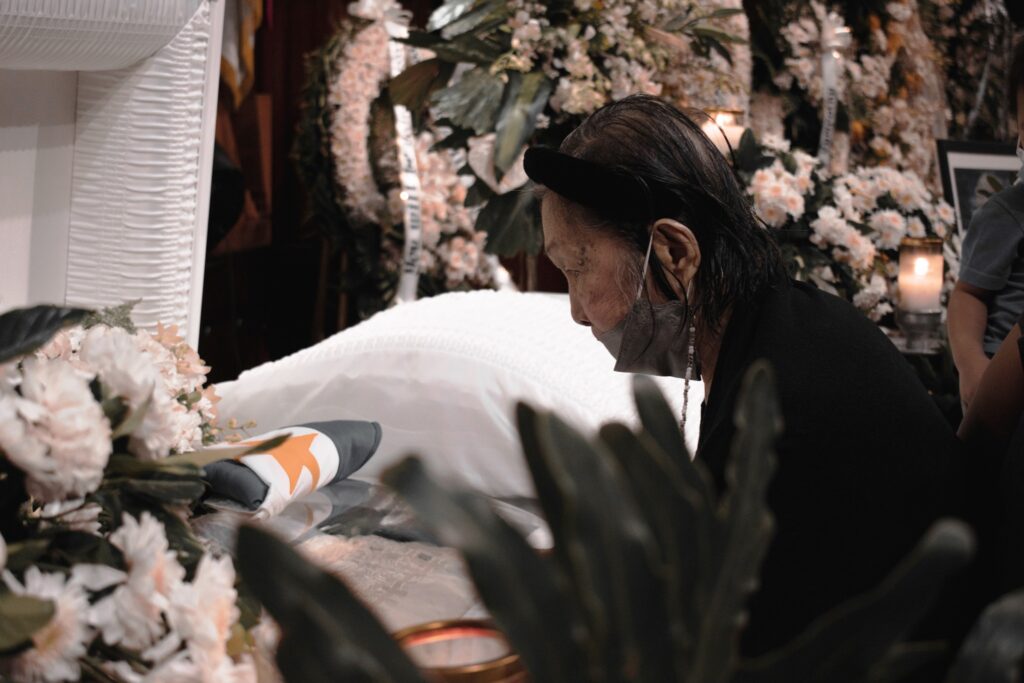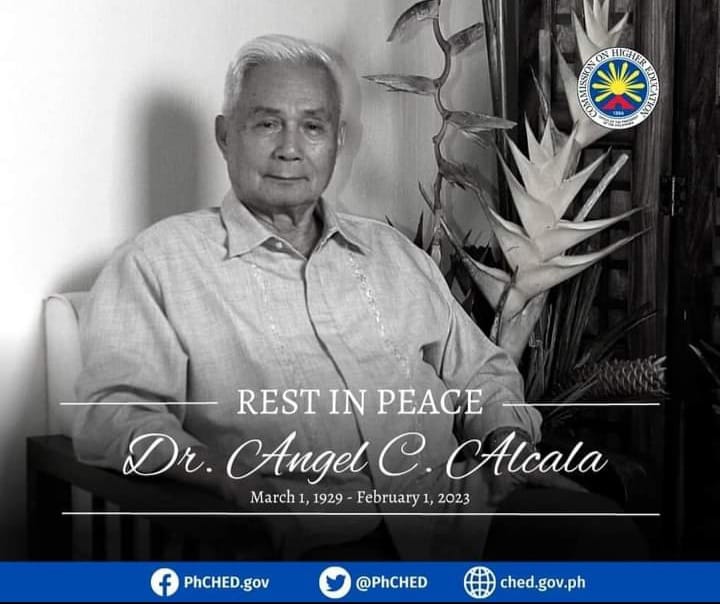Text by Henrylito D. Tacio
Photos from Facebook
Dr. Angel C. Alcala, an acclaimed Filipino scientist died last February 1, 2023, just one month short of his 94th birthday.
One of the very few who was given the status of national scientist, Alcala was recognized for his outstanding scientific contributions to the systematics, ecology, and diversity of amphibians and reptiles and marine biodiversity, reef fishes, and conservation of marine protected areas.
“(His) work has led to the discovery of 50 new species of reptiles and amphibians. More than 10 percent of all reptiles and amphibians in the Philippines are known today because of his work. He was the first Filipino scientist to engage in comprehensive studies concerning Philippine reptiles and amphibians,” said a website.
It was fitting that two species of Philippine snakes were named in his honor: Lycodon alcalai and Opisthotropis alcalai.
According to a press release from the Department of Science and Technology (DOST), “His research and advocacy for marine no-take zones led to a national policy and program that established no-take marine protected areas all over the country and became a model of coastal resource management and conservation that many countries have adopted.”
Dr. Alcala was born in Cauayan, Negros Occidental on March 1, 1929. He grew up in a moderately love-income family of ten siblings, him being the eldest. His family resided in Caliling, a coastal village in Cauayan of Negros Occidental, famous for its immaculate beach.
The young Alcala worked alongside his father who worked as a fisherman at the nearby agricultural fish ponds. That’s where Dr. Alcala’s connection to marine life began. But he dreamed of becoming a medical doctor; in fact, he completed a pre-medical course at Silliman University.
However, due to financial constraints, he chose to stay at Silliman University, where he obtained his Bachelor of Science in Biology (magna cum laude) in 1951. He was accepted to the University of the Philippines College of Medicine but he declined as he wanted to assist his family.
During this time, he sporadically assisted in biological fieldwork, including those initiated by Sidney Dillon Ripley and Dioscoro, with whom they collected the only known (as of 2019) specimen of the Negros fruit dove in 1953.
He completed his master’s degree in 1960 at Silliman University and went to Stanford University where he finished his Doctor of Philosophy in Biological Sciences in 1966. He also received honorary doctorates from Xavier University and the University of Southeastern Philippines.

Dr. Alcala started as an instructor in Biology at Silliman University to various high-ranking positions, including Dean of the College of Arts and Sciences, Director of the Marine Laboratory, and eventually President of the University from 1991–1992.
He founded the Silliman Marine Laboratory, which has been active in research on marine protected areas, fisheries and marine biodiversity, mariculture, and conservation of Philippine plant and animal species. His marine science publications consist of about 80 papers on coral reef fish, marine reserves, and the long-term effects of protection on marine biodiversities such as corals and top predatory fish. Most of these papers have been published in refereed, international journals and books.
In 1992, former President Fidel V. Ramos appointed him as Secretary of the Department of Environment and Natural Resources where he initiated DENR’s program on marine conservation.
Dr. Alcala was also designated as the first Chairman of the Commission on Higher Education (CHED) from 1995 to 1999, where he served with probity, integrity, and transparency. In addition, he promoted faculty capacity building and research projects to encourage research programs in colleges and universities.
He also served as consultant on marine and aquatic projects under the United Nations Environment Program, World Bank, Asian Development Bank, World Bank Global Environment Facility, the Pew Fellowship in Marine Conservation, and the University of the Philippines Marine Science Institute.
For his commendable works, Dr. Alcala received several recognitions and awards. In 1963, he was awarded the Guggenheim Fellowship Fellowship for Natural Sciences in the category for Organismal Biology and Ecology.
In 1992, the Ramon Magsaysay Award Foundation bestowed him Asia’s Nobel Prize for pioneering scientific leadership in restoring and conserving coral reefs of the Philippines. He discovered that to sustain its success, the community members should be involved in the undertaking.
“I am highly honored that I am awarded for trying to know and do the truth,” he said in his response during the awarding ceremony. “At the same time, however, I wish to confess, on behalf of all sincere environmentalists and conservationists, that our endeavors have not been sufficient to stem the tide of human error that has caused such tragedies as Ormoc, the deterioration of our marine life, the denudation of our forest reserves, and the annihilation of what we possess in abundance. In short, the alarming and wanton destruction of our natural resources.”
In 1994, he was given the Field Museum Founders’ Council Award of Merit for his contributions to environmental biology.
Dr. Alcala also received several national recognitions, including the following: the Likas Yaman Award by the Ministry of Environment and Natural Resources in 1979, the Ilaw ng Karunungan Award for Biological Sciences by the Philippine Fulbrighters’ Association in 1983, The Outstanding Biologist for Region VIII by the National Science and Technology Authority in 1985, and Outstanding Men and Women of Science by the Department of Science and Technology in 2009.
In 2011, the Philippine Association for the Advancement of Science, Inc. bestowed him a Gregorio Y. Zara medal for basic science. In 2017, he was named an ASEAN Biodiversity Hero. The following year, he was named a member of the Fulbright Philippines Hall of Fame.
In 2018, he was awarded Oceans Legend by PEMSEA during the East Asian Seas Congress in Iloilo City.
In 2004, Dr. Angel Chua Alcala was elected to the National Academy of Science and Technology, Philippines (NAST PHL) as an Academician and was conferred the Order of National Scientist by virtue of Malacañang Proclamation No. 783 signed by the late President Benigno S. Aquino III on June 6, 2014. He was recognized for his research on ecology and diversity of Philippine amphibians and reptiles, marine biodiversity, and marine protected areas.
The national scientist is the highest recognition given to a Filipino man or woman of science in the Philippines who has made outstanding contributions in one of the different fields of science and technology.
Journalist Chito A. Fuentes, who has encountered Alcala several times, wrote a tribute on Facebook: “(Alcala) was a man who worked hard to get the job done. He remained humble and was under the radar after his stint in the national government. He was uncompromising but he was not the offensive type.
“When he headed the DENR, there were people who thought they could exploit his perceived softness. They, however, underestimated the firm resolve under the gentle exterior. For even under harsh conditions, he remained unruffled.”
Most of the information about this feature came from the DOST press release and Wikipedia.



